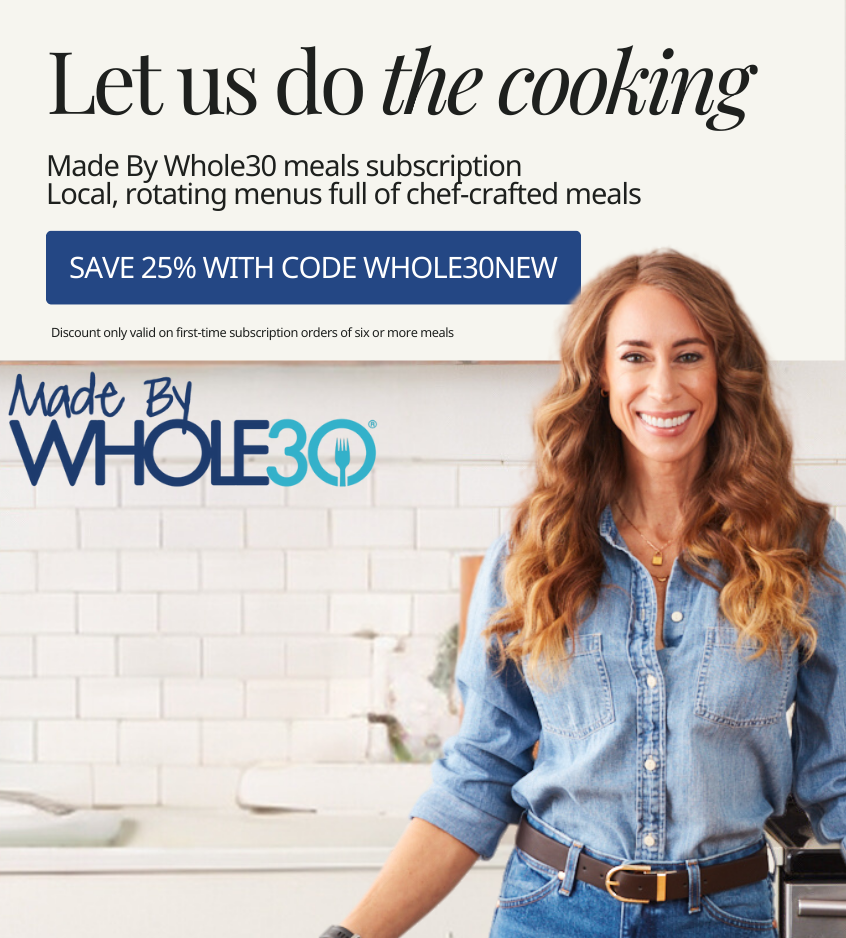It’s your first Whole30, and you’re following our “getting started” recommendations perfectly, especially Step 3—going public. You’ve told your friends, family, co-workers, and all the baristas at your favorite coffee place that you’re doing the Whole30. You tried to recruit someone to do it with you, but no one was quite brave enough yet. But you are undeterred! Plus, you figure once they see the amazing results you are about to achieve, they’ll be lining up to try the program. The month flies by, and it’s Day 31! Your skin is glowing, your energy is through the roof, your confidence it at an all-time high, and you’re down two whole pant sizes. Success! At the next gathering, your friends and family all say how amazing you look. Confidently, you say, “So who’s on board next? Who is ready to do the Whole30?” And you are met with a resounding chorus of “uh, NO,” “no, thanks, “ and likely one “hell, no.” Wait—what just happened? What went wrong? Let’s revisit.
- The 7 mornings in a row when you told the whole office how it actually is hard to drink your coffee black.
- The 3 times you loudly sighed over your hard-boiled eggs and carrots while everyone else at the weekly staff meeting munched on a muffin.
- The 12 times you complained to co-workers about not being able to have a beer after work.
- The 12 times you complained to your spouse about not being able to have a glass of wine.
- That one really bad morning when you told your husband, “I will punch you in the face if you smile at me before 8 AM.”
- That Sunday you passed on brunch because it would have been too hard to watch everyone eat pancakes.
- The 19 times you got mad at your friends for eating (fill in food) in front of you.
- The 412 times you complained about how much cooking and clean-up you had to do.
Oh. So yeah, maybe that’s why your friends and family don’t want to do the Whole30. (Ya think?)
It’s Your Attitude
It’s okay to share your struggles with those you are closest to. But important point #1: if you’re hoping to be a role model for friends and family who really need the program, you’re going to have to watch your attitude. Complaining about every aspect of the program isn’t going to get them excited about joining you, even if your results are stellar. See, most of them have been through enough miserable quick-fix diets that they can recognize one when they think they see one—a month of horrible deprivation followed by short-term weight loss, followed by even faster weight re-gain (and then some). So when they see you on this “crazy” restrictive diet complaining night and day about how hard it is, in their minds, “Whole30” is synonymous with all those other quick fix, fad diets, and basically, your chances are shot. This is true even if you start talking about how awesome you feel come Day 21… those three weeks of complaining carry way more weight than a few days of “I’ve found my Tiger Blood!” So, how can you be authentic with friends and family about your Whole30 experience without accidentally scaring them away? Here’s how.
Take A Pause
It’s okay to share the tough times with people interested in the program—after all, you don’t want to paint a false picture that the Whole30 is all sunshine and rainbows. But resist the urge to verbally vomit all the tough things you’re going through when someone asks, “How are you doing with this new diet?” Take a pause before you speak. Gather your thoughts, and give yourself room to ask yourself, “Is this really how I’m feeling, or am I having an emotional moment right now?” See if there’s a constructive way to phrase what you are experiencing, rather than just telling them, “It sucks right now.”
Phrase Carefully
If you’re going through a tough time in your Whole30 journey, be authentic about it—but phrase it in a way that’s not going to make it sound like you’re a victim, and don’t exaggerate for effect’s sake. Saying, “This is the worst thing I’ve ever done!” may elicit a laugh, but it’s also likely to turn off any hope of getting them on board in the future.
Follow it Up
If you did share some of your struggles, don’t just leave them hanging on the negative. Follow up your comments with what you’re doing to get through the tough times, or some resources you’ve discovered that are helping, or what you’re looking forward to when this temporary stage is over.
Share the Good
Remember to share the positive things you are experiencing too, not just the hard parts. If you can find something honestly positive to say about your experience so far, add that. If in that moment, there are no rainbows, don’t make something up. However, the next time you see that person, if you find yourself in a different place, let them know!
Ask Them How They Are Experiencing You
Your conversation isn’t over here, though. Now, it’s your turn to ask them a question: “How do I seem to you?” This is important, as how you think you’re behaving and how others see you behaving may be quite different. You may believe you acted normal at the office birthday celebration, but your co-worker might say, “You seem sad. You weren’t yourself at the party yesterday. Is this diet making you depressed?” Understanding how others are seeing you may open the door to having a really valuable conversation (“No, but I’m still stuck on the idea that people won’t think I’m as fun if I’m not eating junk food or drinking wine,”) or may just make you aware of body language, non-verbal cues, or an attitude you had no idea you were exhibiting.
Phone a Friend (Who Gets It)
Finally, accept that there are times when you’re just going to want to get it all off your chest, whine like a baby, get angry, and vent your frustrations. There’s nothing wrong with that; in fact, it’s probably healthy, as often saying something out loud makes it lose most of its power over us. But you need to choose the recipient of your “verbal vomit” carefully. Your spouse, kids, boss, or best friend may not be the right person, especially if they’ve never done the Whole30 and have no context in which to frame your complaints. So, find someone else. Choose the person who told you about the program, vent on our Facebook page (you know we get it), or make some friends on our Whole30 Forum who are going through the same things you’re going through. Get it all out with them, so you aren’t bursting with unspoken fears, anxieties, or frustrations when you get home to your family or walk into the gym and see your friends. Buying yourself that space can help you pause, phrase carefully, follow it up, and share the good with the people who mean the most to you, and greatly increases the chance that you’ll be able to truly inspire those you love with your Whole30 results and the experience you shared with them along the way.

















